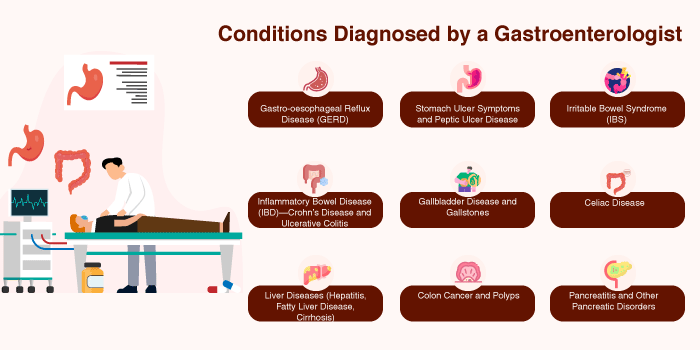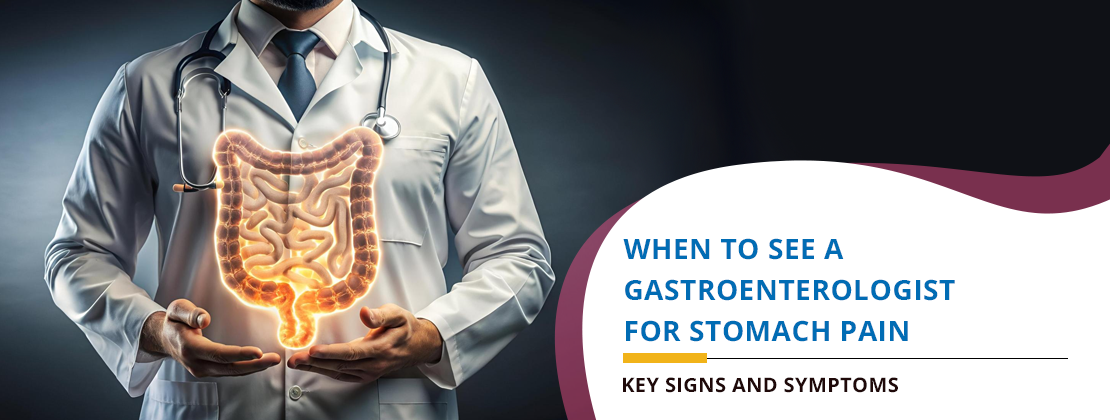Understanding Stomach Pain: Common Causes

People of all ages experience stomach aches for various reasons.
However, if one continues to have mild to severe pain in their stomach, it could be a sign of a serious health condition that demands medical attention.
Stomach pain could be caused by various reasons:
- Indigestion: Caused by overeating, consuming spicy or fatty foods, or excessive caffeine and alcohol intake.
- Gastroesophageal Reflux Disease (GERD): GERD is a chronic condition wherein stomach acid frequently flows back into the oesophagus, causing heartburn.
- Stomach Ulcers: Open sores that develop on the stomach lining due to infection or prolonged use of nonsteroidal anti-inflammatory drugs (NSAIDs).
- Irritable Bowel Syndrome (IBS): A disorder affecting bowel function, causing bloating, cramping, and irregular bowel movements.
- Food Intolerances and Allergies: Reactions to certain foods, such as dairy or gluten, leading to digestive issues.
- Gallstones: Hardened deposits in the gallbladder that can cause severe pain and digestive distress.
- Cancer: Cancers growing in the abdominal region can cause stomach pain, which is often persistent and gets worse with time.
Key Signs That You Should Visit a Gastroenterologist
While mild stomach pain often resolves on its own, certain symptoms require professional evaluation. Here are key signs that you should see a GI specialist for a proper evaluation.
- Persistent or Severe Stomach Pain
If you experience severe stomach pain that lasts more than a few days or worsens over time, it could be a sign of a serious condition such as appendicitis, ulcers, or gallbladder disease. Failure to attend to this pain could result in complications that need urgent medical attention.
- Unexplained Weight Loss
Losing weight without changes in diet or exercise can indicate digestive disorders like Crohn’s disease, coeliac disease, or even stomach cancer. It is essential to get screened early to rule out any serious health concerns.
- Chronic Heartburn or Acid Reflux
Frequent acid reflux or heartburn that doesn’t improve with over-the-counter medications may indicate the presence of GERD. GERD needs medical treatment to avoid problems such as erosive oesophagitis and Barrett’s syndrome.
- Difficulty Swallowing
When you have trouble swallowing food and drinks or feel pain, it might be because of disorders such as esophageal stricture, GERD, or even esophageal cancer. Additionally, choking as well as a lack of nutrients can occur if one finds it hard to swallow.
- Blood in Stool or black stool
Visible blood in stool or black, tarry stools may indicate gastrointestinal bleeding, ulcers, or inflammatory bowel disease (IBD). Seeking immediate medical attention can prevent further complications.
- Persistent Bloating and Gas
Excessive bloating, gas, and discomfort that persist for weeks could be signs of conditions such as IBS, lactose intolerance, small intestinal bacterial overgrowth (SIBO), or even ovarian cancer in women. Consulting a gastroenterologist can help identify the cause.
- Chronic Diarrhoea or Constipation
Frequent diarrhoea or constipation lasting more than a few weeks may indicate IBS, infections, or more severe digestive issues requiring gastroenterology treatment. Persistent changes in bowel habits should not be ignored.
- Vomiting or Nausea That Won’t Go Away
Recurring nausea and vomiting could be a sign of gallbladder disease, stomach ulcers, gastrointestinal obstruction, or even liver disease. Seeking professional evaluation can help determine the cause and proper treatment.
- Family History of Digestive Disorders
If you have a family history of conditions like Crohn’s disease, ulcerative colitis, or colon cancer, regular checkups with a gastroenterologist are crucial for early detection and preventive care.
Conditions Diagnosed by a Gastroenterologist

A gastroenterologist specialises in diagnosing and treating conditions affecting the digestive system, including:
- Gastro-oesophageal Reflux Disease (GERD)
- Stomach Ulcer Symptoms and Peptic Ulcer Disease
- Irritable Bowel Syndrome (IBS)
- Inflammatory Bowel Disease (IBD)—Crohn’s Disease and Ulcerative Colitis
- Gallbladder Disease and Gallstones
- Celiac Disease
- Liver Diseases (Hepatitis, Fatty Liver Disease, Cirrhosis)
- Colon Cancer and Polyps
- Pancreatitis and Other Pancreatic Disorders
What to Expect During a Gastroenterologist Visit

- Medical History and Symptoms Review: The doctor will ask about your symptoms, medical history, lifestyle habits, and diet.
- Physical Examination: A physical exam may include palpating your abdomen to check for tenderness or swelling.
- Diagnostic Tests: Depending on your symptoms, the doctor may recommend tests such as:
- Endoscopy or colonoscopy to examine the digestive tract
- Blood tests to check for infections or liver function
- Imaging tests like ultrasounds, MRIs, or CT scans
- Stool tests to identify infections or digestive disorders
- Treatment Plan: Based on the diagnosis, the gastroenterologist will suggest dietary changes, medications, or further medical interventions if needed.
- Preventive Care: If you have a high risk of digestive conditions, your doctor may recommend lifestyle modifications and regular screenings to detect problems early.
Conclusion
Stomach pain can range from mild discomfort to a symptom of serious underlying conditions. If you experience persistent abdominal pain, severe stomach pain, or symptoms like blood in your stool, difficulty swallowing, or unexplained weight loss, it’s crucial to know when to see a gastroenterologist. Early diagnosis and treatment can prevent complications and improve your quality of life. If you’re seeking expert care, consider consulting the best gastroenterologist in India or visiting the best gastroenterology hospital in India for a comprehensive evaluation and treatment.



